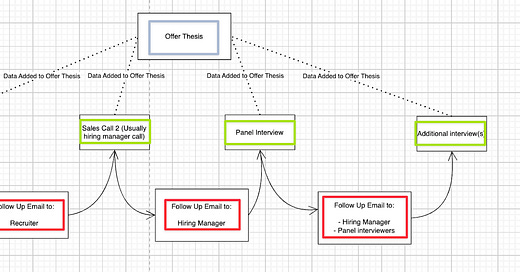The #1 Interviewing Approach
Introduction
We've run hundreds of searches.
This document condenses our most valuable insights.
Theory
When you interview with a company, the probability you get an offer is strongly tied to how clear both you and your potential employer are on why you should be hired.
At Relentless, we call the argument to hire a candidate an offer thesis.
An offer thesis explains the following:
The outcome you will drive at the company
The business value that this will create
The likelihood that you will be able to deliver on the outcome
The likelihood that you are one of the few possible candidates for the role (which means that the company doesn’t have a choice but to hire you if they want to achieve this desirable outcome)
The budget they have (which should be multiples of 6. “The price you’re charging”)
The price you’re charging (which should be a fraction of 2. “The business value that [you] will create”)
When you find a role that:
Scores highly on 1 through 6 and
Clearly communicate 1 through 6 to your potential employer (either verbally or through a written argument)
… the likelihood you get a highly paid offer exponentially increases.
It follows that the purpose of an interview process is to:
Gather the data you need to determine if 1 through 6 is high and
To communicate that it’s high to your potential employer
It then follows that each interview in the interview process should be viewed as a “Sales Call” where you have two goals:
Gather data: Get data for your “Offer Thesis”
Progress in the interview process: Get to the next “Sales Call” in the process so you can continue getting data
It follows further that each interlude between interviews should be treated as an opportunity to send a “Follow Up Email” which is used to increase the chance that you Progress in the interview process.
Example
For example, here's an example of an “Offer Thesis” for a sales leadership position → CLICK to read.
The candidate got the data to make this argument by going through a series of “Sales Calls” and sending “Follow Up Emails”
A good “Sales Call” script you may want to use is linked here → CLICK to read.
A good template bank for “Follow Up Emails” you may want to use is linked here → CLICK to read.
We encourage you to click the links to familiarize yourself with each process.
Want help landing your next role?
Head to our site: joinrelentless.com



